 Trinity Church, Copley Square
weekend; they weren't in her bag so she must have forgotten them. What had she left? "a pink J. Crew, a yellow J. Crew, and a Banana Republic."
Trinity Church, Copley Square
weekend; they weren't in her bag so she must have forgotten them. What had she left? "a pink J. Crew, a yellow J. Crew, and a Banana Republic."
On our way across Copley Plaza one morning, we passed a group of perhaps sixty young adults doing calisthenics, and on the way home in the same area we passed a Farmers' Market. These markets are held several days each week, busiest when officeworkers head home, their organic vegetables and whole-grain bread tucked into their L. L. Bean totebags.
In the Doubleday bookstore in Prudential Center, a young woman was on her cell phone: she had left some clothes behind at her friends' house over the  Trinity Church, Copley Square
weekend; they weren't in her bag so she must have forgotten them. What had she left? "a pink J. Crew, a yellow J. Crew, and a Banana Republic."
Trinity Church, Copley Square
weekend; they weren't in her bag so she must have forgotten them. What had she left? "a pink J. Crew, a yellow J. Crew, and a Banana Republic."
We are unnerved by narrow one-way streets that still curve the way they did in the seventeenth century, by drivers that honk immediately after the light turns green, by five- and six-way intersections, and by pedestrians who run in front of our car. At the sound of sirens, many drivers speed up and dash across intersections in front of the oncoming emergency vehicles. We remember our old aphorism, discovered when we lived here in 1964-66: "the car turning left has the right of way."
Our hotel is in the Copley Square area, right next to Back Bay, where the New England Historic Genealogical Society is located. There we have spent most of our days for two weeks, surrounded by books and manuscripts. Library materials are on four floors: British genealogy, genealogies and reference, local histories, and the dreaded microforms area. This last is staffed by young, computer friendly librarians, who are generally less savvy about traditional genealogy.
A number of libraries we've visited have tended to split apart machines and traditional library materials, evidently unaware that the information (and consequently, the needs of library users) is the same whether it's on computer media or old-fashioned paper. It would be interesting to see some libraries try  Boston Reflection
vertical integration, with subject matter classifications dividing the materials, instead of media type.
Boston Reflection
vertical integration, with subject matter classifications dividing the materials, instead of media type.
Just about all of the material is available for browsing, and the staff is quick to fetch anything which has been stored away (usually because it is too fragile for the open shelves). Large tables with comfortable chairs, good lighting, soft carpets, and a plentiful supply of outlets for our laptop computers make this a most enjoyable way to do genealogical research.
With the exception of one or two drizzly days, Boston has shown us its best weather, with golden sunsets, green parks, bright flowers, and a fresh sea breeze. We can eat a bagel or sandwich outdoors if we like, while watching the intriguing mix of people in this neighborhood - yuppies, students, tourists being driven around in huge purple and chartreuse DUKWs, panhandlers, even a couple of young Asian men giving arm massages on the sidewalk - for a fee, of course. The recipient sits on a tiny stool and stretches his or her arm through a hole in a padded wooden stick, while the practitioner massages hands and wrists and (apparently) pulls on the arm. Can any reader tell us the name for this practice?
Aside from our intensive genealogical research, we've had two lovely visits with Bob's cousin Marilyn, and an afternoon with our friends Sarah and Jim. When we leave Boston we'll travel to smaller New England cities and towns before we head south for the winter. We look forward to visiting more friends and relatives as autumn progresses.